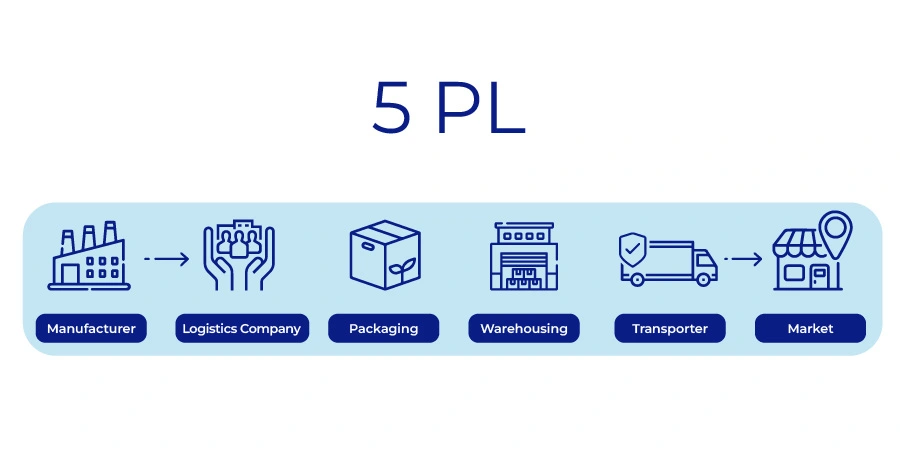Is Fifth-Party Logistics (5pl) the Future of Logistics?
In the realm of logistics services, terms like 3PL (Third-Party Logistics) and 4PL (Fourth-Party Logistics) have become widely known, reflecting the evolving landscape of supply chain management. However, the emergence of 5PL (Fifth-Party Logistics) introduces a new dimension to logistics sophistication that demands exploration. While 3PL and 4PL are currently the predominant services, the spotlight is gradually shifting towards the prominence of 5PL in the modern supply chain. Unveiling the concept of 5PL involves delving into the intricate factors that characterize each level of logistics service. This article aims to shed light on the evolving role of 5PL and the factors that make it increasingly significant in navigating the complexities of contemporary supply chain management.
What is fifth-party logistics (5PL)?
Fifth-Party Logistics, or 5PL, refers to a framework where an entity, typically a customer organization, delegates all aspects of its supply chain operations to a logistics service provider. In the 5PL model, the logistics company assumes the responsibility of strategizing, coordinating, and executing comprehensive logistics solutions on behalf of its clients.
In the diverse spectrum of supply chain operations, 5PL integrates the utilization of both third-party logistics (3PL) and fourth-party logistics (4PL) services while overseeing the entirety of network management within the supply chain. Moreover, the 5PL company will set the price, but in some cases, the determined price will be renegotiated.
Providers of 5PL services leverage cutting-edge technology for their operations, encompassing tasks ranging from implementing logistics solutions to engaging in price negotiations. Similar to 4PL, the business model of 5PL encompasses this comprehensive series of processes, enabling it to exercise complete control over the operational intricacies of the supply chain.
Why does 5PL appear when there is 4pl?
The emergence of 5PL is to meet the needs of modern supply chain management, provide enterprises with comprehensive logistics solutions and value-added services, and help enterprises optimize supply chain processes, improve logistics efficiency, and reduce costs.
With the rapid development of globalization and e-commerce, the logistics needs of enterprises have become more and more complex. Compared with the previous model, 5PL tends to meet the needs of future logistics enterprises and has an important impact on the development of today's Internet of Things. . Enterprises need a comprehensive logistics solution that can integrate and manage the entire supply chain process, including procurement, production, warehousing, transportation, distribution and after-sales service.
Fifth-party logistics providers usually have advanced logistics information systems and professional logistics management teams, and can provide enterprises with comprehensive logistics solutions. They can help companies optimize supply chain processes and update logistics information in real time.
what is the difference between 3pl 4pl and 5pl?
The key differences between 3PL (Third-Party Logistics), 4PL (Fourth-Party Logistics), and 5PL (Fifth-Party Logistics) lie in their roles, scopes, and levels of involvement in supply chain management:
3PL (Third-Party Logistics)
Role: Provides specific logistics functions, such as transportation, warehousing, and distribution, on behalf of a client.
Scope: Focuses on individual tasks within the supply chain.
Involvement: Typically handles physical logistics operations and transportation.
4PL (Fourth-Party Logistics)
Role: Integrates and manages the entire supply chain, often acting as a central point of contact and overseeing multiple 3PLs.
Scope: Coordinates and optimizes various logistics providers, aiming for an efficient and streamlined supply chain.
Involvement: Involves strategic planning, coordination, and management of logistics services.
5PL (Fifth-Party Logistics)
Role: Assumes a comprehensive role, managing the entire supply chain and incorporating 3PL and 4PL services while leveraging advanced technologies.
Scope: Encompasses end-to-end supply chain management, strategic planning, and the integration of technologies.
Involvement: Offers a fully managed logistics solution, including advanced technologies, strategic planning, and often sets pricing structures.

While 3PL specializes in individual logistics functions, 4PL takes a more holistic approach by managing multiple logistics providers, and 5PL further expands its role to become a comprehensive supply chain manager, integrating advanced technologies and strategic planning for end-to-end logistics management.
What Is the Key Role of the 5PL Company?
The key role of 5PL companies is mainly reflected in the following aspects:
Provide comprehensive logistics solutions
5PL company has profound logistics expertise and experience, and can provide comprehensive logistics solutions including transportation, warehousing, distribution, packaging, loading and unloading, information management and other links according to the specific needs of enterprises.
Optimize supply chain processes
5PL Company has an advanced logistics information system and a professional logistics management team that can conduct in-depth analysis and optimization of supply chain processes to help companies improve logistics efficiency and reduce costs.
Provide real-time logistics information updates
5PL companies usually have a complete logistics information system that can track and manage the logistics transportation process in real time, and provide real-time logistics information updates to help companies keep track of the logistics status at any time.
Integrate and manage logistics resources
5PL company has strong resource integration and management capabilities, which can help enterprises integrate and manage various logistics resources, including transportation tools, warehousing facilities, human resources, etc., thereby improving logistics efficiency and quality.
Provide supply chain financial services
Some 5PL companies also provide supply chain financial services to help companies solve capital flow problems and improve capital utilization.
Provide professional e-commerce logistics services
With the rapid development of e-commerce, some 5PL companies also provide professional e-commerce logistics services to help companies cope with the challenges of e-commerce business.
The key role of 5PL company is to provide comprehensive logistics solutions, optimize supply chain processes, provide real-time logistics information updates, integrate and manage logistics resources, provide supply chain financial services, and provide professional e-commerce logistics services, thereby helping companies improve their logistics efficiency and quality, reduce costs and enhance competitiveness.





